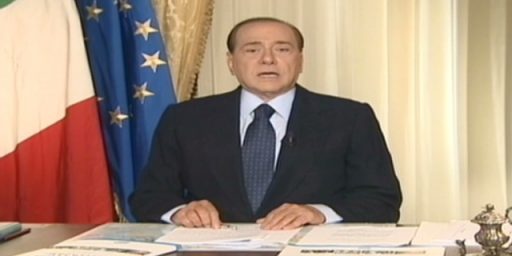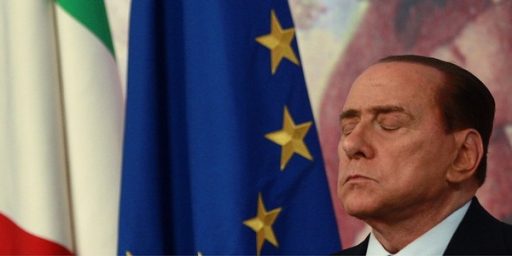Italy has a New Government
After months of impasse, a new coalition has been formed in Italy.
Via the BBC: New Italian ‘grand coalition’ government sworn in
Democratic Party Deputy Leader (PD), Enrico Letta, becomes prime minister at the head of a “grand coalition” including Silvio Berlusconi’s People of Freedom party (PDL).
The swearing-in signals the end of two months of political deadlock.
[…]
Correspondents say the “grand coalition” between Italy’s current main right- and left-wing parties is unprecedented, and will probably prove an uneasy alliance.
I cannot find a definitive detailing of the coalition, beyond the fact that it is based on the PD+PDL. The passage above, and some other news stories, intimate that other parties may be involved, but I cannot tell if this is lazy hedging on the part of the reporters (i.e., they aren’t really sure, so went with vague language), or if it is lazy reporting (they couldn’t be bothered to provide the details). Certainly, parties/elections geeks such as myself would like the full run-down. Of course, part of the reason for the vagueness is that for a government to form, there has to be agreement in both the Chamber of Deputies and the Senate.
The BBC piece linked above does provide a roster of the cabinet, but does not identify the party affiliations of the ministers, apart from the obvious fact the PM is from the PD along with the note that the Deputy PM (and Interior Minister), Angelino Alfano, is from the PDL. Berlusconi himself will not be part of the government.
Beyond the specifics, the new government has its work cut out for it:
President Napolitano said on Saturday that the government would have the support of both chambers of parliament.
“I hope that this government can get to work quickly in the spirit of fervent co-operation and without any prejudice or conflict,” he said.
“It was and is the only possible government.”
The BBC’s David Willey, in Rome, says the new government has to deal with a rapidly declining economic situation, rising unemployment – particularly among the under-35s – and lack of growth, despite some draconian austerity measures passed by the previous government of technocrats.
Balancing the ideological impulses of the coalition partners will be difficult (from the NPR write-up on the new government):
Berlusconi, a fervent anti-Communist, views Italy’s left as a personal nemesis, and Letta’s Democratic Party has some of its roots in what was the West’s largest Communist Party.
Meanwhile, as an illustration of the political context, there was violence on the day that the announcement (back to the BBC piece):
Away from the ceremony, outside the PM’s office, two police officers were injured in a shooting incident.
One was shot in the neck and is described as being in a serious condition. The second suffered a serious wound to the leg. A pregnant woman was also slightly hurt.
A man, named as Luigi Preiti, has been arrested.
Prosecutors said he had confessed to targeting politicians, angry that he had lost his job.
Rome Prosecutor Pierfilippo Laviani said he “wanted to shoot politicians, but given that he couldn’t reach any, he shot the Carabinieri”.
The Mayor of Rome Gianni Alemanno said: “It’s not an act of terrorism but certainly the [political] climate of the past few months has not helped.”





The absurdity of the situation is demonstrated by both parties (including one with roots in communism) embracing the same neo-liberal economic ideology. In the end there are no left-wing parties remainng in the developed world, not when they endorse policies which put millions out of work and on the unemployment line.
There will be no changes of any significance from this government. Its sole reason for existence is to defend elite privilege (and corruption) from the populist Five-star movement.
Does it matter?
We’re dysfunctional but somehow we manage to appear to have a functionting federal government, whereas for some reason, Italy can’t fake it as well as we can.
@al-Ameda:
That´s why that I think that a Parliamentary system under proportional voting is a bad idea.
Each region in Italy is politically, socially, and economically different from any other Italian region. the only thing they share is catholicism. Italy has like 10 political parties, plus when I lived in Napoli I learned that nothing political matters in Italy. Society functions in spite of their elected leaders, and somehow it works. Benevenuto al sud!
@Andre Kenji:
Actually, Italy’s current electoral system is not especially proportional.
@al-Ameda: i live in italy and, as bad a sthe US gov’t is, the italian gov’t is even worse. berlusconi’s party PDL is a private feifdom and PD is a hodgepodge of center-left parties who still don’t understand how to win a national election. the result is chaos.